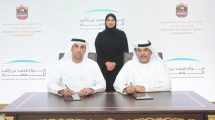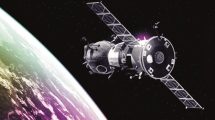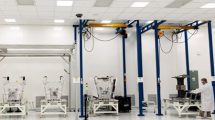 Mohammed Bin Rashid Space Centre (MBRSC) launched the first edition of the Project Space event, on the 24th and 25th January 2017 at the Dubai World Trade Centre. On day one, the event saw some of the most influential space scientists and professionals in the space industry from the UAE and internationally gather to present their work to the students of the UAE and gathered dignitaries.
Mohammed Bin Rashid Space Centre (MBRSC) launched the first edition of the Project Space event, on the 24th and 25th January 2017 at the Dubai World Trade Centre. On day one, the event saw some of the most influential space scientists and professionals in the space industry from the UAE and internationally gather to present their work to the students of the UAE and gathered dignitaries.
Project Space aims to inspire university and high school students by establishing a professional scientific platform for space science, research and technology, empowering them to utilise scientific space discoveries, while learning expert views on the future for the sector, and human endeavours in outer space.
H.E Hamad Obaid Al Mansoori, Chairman of the Board of Directors at the Mohammed bin Rashid Space Centre, thanked His Highness Sheikh Hamdan bin Mohammad bin Rashid Al Maktoum, Crown Prince of Dubai, Chairman of Mohammed Bin Rashid Space Centre and general supervisor of all projects of the Centre and its strategic and development plans, for his generous patronage for Project Space.
Al Mansoori said: “Under the directives of our visionary leadership, we, in the United Arab Emirates are getting prepared for a post-oil era, which is characterized by the diversification of economic activities. In doing this, over the past decade, the UAE has established a solid basis for sustainability, innovation, science, technology and space exploration and made it part of key national indicators. We are looking at the space sector as a driver for economic growth and sustainable social development”.
“We are marching towards the realization of our national Vision 2021, positioning our country as one of the best nations in the world. In working hard to fulfil our ambition for space exploration, we are integrating space technology in our national development projects. We are working hand in hand with the UAE Space Agency, hoping that this will contribute to our national goals for the future”, he added.
“The discussions of this esteemed conference are essential to achieve a sustainable future for our space sector; and I hope that your recommendations will enhance and activate the role of space science and technology in achieving comprehensive economic and social development.,” Al Mansoori concluded.
In his speech, H.E Dr. Mohammed Al Ahbabi, the During his speech, H.E. Dr. Mohammed Al Ahbabi, Director General of the UAE Space Agency, presented a working paper reviewing the strategic objectives and ongoing initiatives taking place throughout the national space sector. He emphasised the important role being played by the space sector in sustainable economic diversification and growth, as well as its contribution to strengthening the UAE’s regional and international standing.
Dr. Al Ahbabi addressed the projects and plans currently in place to realize the strategic objectives for the national space sector, noting that investment has exceeded AED 20 billion – the largest in the region.
He went on to outline the mission of the UAE Space Agency, as well as the context surrounding its foundation and its most significant achievements so far. In particular, Al Ahbabi highlighted the Agency’s efforts to raise awareness throughout UAE society about the importance of the space sector, and the work being done to attract best and brightest talents to this vital sector. He also highlighted the importance of developing bilateral relations with international space agencies and organizations.
The forum schedule started with a discussion session on the Knowledge Transfer Programme adapted by MBRSC. Salem Al Marri, Assistant Director General for Scientific and Technical Affairs at MBRSC, Dr. Byungjin Kim, the CEO of Satrec Initiative – the centre’s strategic partner in the knowledge transfer programme from South Korea, Omran Sharaf, the Project Manager of Emirates Mars Mission – Hope, Eng. Amer Al Sayegh, Senior Director, Space Engineering Department and KhalifaSat Project Manager, and Mohammed Al Harmi, MBRSC Director of Corporate Development, contributed to the panel discussion which covered the story of the establishment of the centre, through gaining the experience and knowledge needed to work on space projects, right up until today, where they are able to take on missions as complex as sending a probe to Mars.
In his speech, Al Marri addressed the vision and goals of Dubai government to establish a professional centre for space and advanced technology, stressing the importance of adapting a knowledge transfer strategy in the development of scientific and technological sectors.
Al Marri highlighted the strategic partnership with Satrec Initiative, offering expertise and techniques and knowledge that contributed to empowering the UAE engineers, enabling them to design and manufacture the first Arab satellite on UAE soil, and therefore, leading an ambitious space project for outer space discovery.
Dr. Byungjin Kim introduced the audience to Satrec Initiative, and the organisation’s goals and journey in the satellite manufacturing industry and space technology. He addressed the company’s mission aimed at offering knowledge transfer programmes.
Dr. Kim also commented on the strategic partnership with MBRSC, which has been ongoing since 2006, and applauded the efficiency and dedication of the UAE engineers and their great competence in leading important space projects.
During the panel discussion, Al Marri, Sharaf, Al Harmi and Al Sayegh talked about their personal experiences in the early days of the space centre and their participation in the knowledge transfer programme in South Korea. They gained a great deal of knowledge and technical information that enabled MBRSC to launch and operate “DubaiSat-1” and “DubaiSat-2”, and to manufacture KhalifaSat currently, as well as developing the Emirates Mars Mission – Hope.
The MBRSC engineers described their experience after they came back to Dubai, and how they transfer the skills and expertise to the new generation of engineers who have joined the space centre recently, as well as the students who participated in the nanosatellite outreach programs. In this regard, Al Marri confirmed that MBRSC seeks to develop and qualify UAE experts to drive the UAE space sector to competitive positions globally.
“Looking for Life on Mars and Searching for Cancers on Earth, One Laser Pulse at a Time” was the title of a session presented by Dr. Noureddine Melikechi, Eng. Amer Al Sayegh, Senior Director, Space Engineering Department and KhalifaSat Project Manager. He explained how he was brought up as a young boy in a small Algerian village and how he became a highly regarded scientist in America. Melikechi utilises laser technology to discover what lies beneath the surface of the Red Planet, as well as for early cancer detection here on Earth.
Abigail Harrison, the leader of The Mars Generation, shared her ambitions in space with the captivated young audience. A space and science advocate, ‘Astronaut Abby’ as she is well-known worldwide, talked about her plans towards fulfilling her dream to become the first human on Mars. Abby emphasised the importance of human Mars exploration and how the UAE youth can participate in the Mars Generation Initiative.
Dr. Mike Brown, Professor of Planetary Astronomy at the California Institute of Technology (Caltech), presented a lecture entitled “How I Killed Pluto!”. Brown explained how he has since made it his mission to find a ninth planet in the Solar System to replace Pluto, after it was downgraded from planet status to a dwarf planet. Having discovered Eris, it was Dr. Brown who in effect sealed the fate of Pluto as a planet.
The first day of Project Space included a workshop on “How to design and build a Satellite” using KhalifaSat as a model. First, Engineer Ahmed Salem gave the audience a detailed explanation about the various stages of satellite development from launch until it reaches its orbit, and then operating it later.
This was followed by a panel discussion by a number of MBRSC experts on developing the advanced systems, including energy saving in space, space communications and other projects. The workshop was concluded with a discussion session to answer all the questions asked by students.
The event also included another workshop by Noora Al Shehi, Acting Manager, Talent Acquisition & Recruitment Section at MBRSC, introducing the university and school students about the MBRSC initiatives and efforts to attract talent. She also gave a brief about the Entaliq Scholarship Programme. The workshop included testimonials from a number of new engineers and administrative officers, talking about the journey they made until they joined the space centre. The attendees also were briefed about the working environment at the centre.
The first day also included each of the presenters fielding questions in sessions with members of the audience to discuss their presentations.












Add Comment